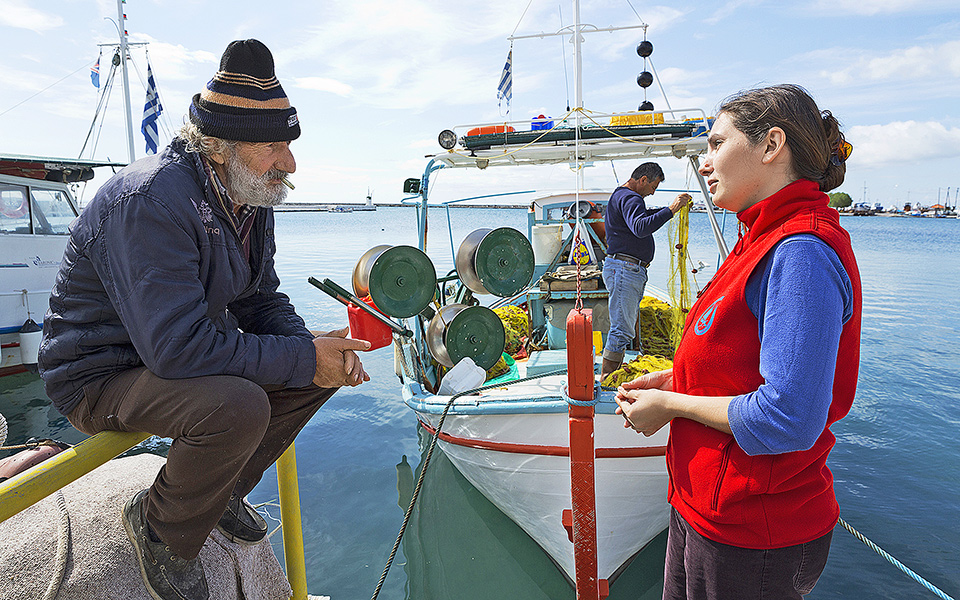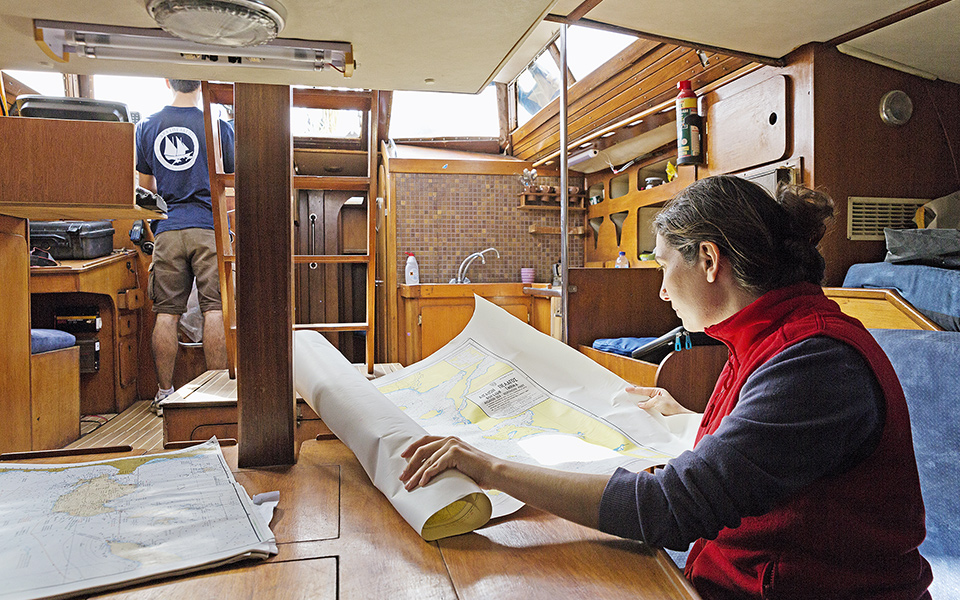Our small boat arrived at Lipsi, the main island of a cluster of 30 islets and rocks of the same name in the northern Dodecanese, on an August morning. We paused for coffee and cheese pie at the traditional Kairis bakery, a classic stopover for anybody familiar with the small island. This is where I met Anastasia Miliou, scientific director of the Archipelagos Institute of Marine Conservation.
The organization’s logo on her t-shirt and scratches and scrapes on her hands and legs left by her work prompted my initial questions.
From the start of our conversation, it became apparent that Miliou was onto something important, on a global scale. Archipelagos is striving to establish an island-based marine life sanctuary.
“Each year, numerous cases of injuries sustained by various marine species, including dolphins and sea turtles, are recorded, but no infrastructure exists for us to offer treatment. To be precise, some very basic facilities do exist, but in an artificial environment. In other words, a tank in a city,” Miliou explained.
“We are preparing to set up a sanctuary at a secluded bay in the northwestern part of the island that will operate as a clinic for marine species, as well as an experimental field, where we will try to recreate the Mediterranean’s ecosystem as it was prior to being downgraded by man. And, of course, the facility will also serve as international research and training center,” she continued.
Archipelagos, a non-profit, non-governmental organization, was established in 1998. It conducts multifaceted research and offers conservation activities covering the wider Greek sea region and northeastern Mediterranean. Every year, hundreds of scientists and students from all over the world, even Canada, India and New Zealand, come to Greece to support the institute’s activities. This year alone over 600 visiting contributors have already been drawn to the effort.
“We are preparing to set up a sanctuary at a secluded bay in the northwestern part of the island that will operate as a clinic for marine species, as well as an experimental field, where we will try to recreate the Mediterranean’s ecosystem”

“The Aegean sea contains the last remaining major sea forests, as well as large and significant coralline red algae, coral reef plants referred to as traganes by local fishermen, and ecosystems of impressive beauty, now some 7,000 to 8,000 years old. ”
Interdisciplinary in nature, the activities undertaken by Archipelagos attract scientists specializing in various fields, including ichthyologists, marine biologists, zoologists and ornithologists. Besides an array of scientists, the institute also draws professionals from other backgrounds, including lawyers focused on environmental issues, journalists and even graphic artists and animation designers.
“None of all this has resulted from public relations activity. PR is something we’re not at all good at,” Miliou pointed out. “It’s the fruit of the quality of our work, which involves extensive research through the management of environmental issues in a region such as the Aegean, regarded as an area of unique natural beauty.”
A fiercely independent organization, Archipelagos refuses to accept any sponsorship or state-funding support. “Environmental problems cannot be solved through Greek state or European funding or through donations from corporations that generate profits by burdening the environment and endangering public health. That would be contradictory,” she stressed.
Asked what she would offer in response to those who question the need to offer protection to the Aegean, Miliou is to the point: “Because it possesses unique wealth that does not belong to us – it’s a part of the world’s natural heritage as well as the heritage belonging to our children. The Aegean is Europe’s richest region in terms of biodiversity. It contains the last remaining major sea forests, as well as large and significant coralline red algae, coral reef plants referred to as traganes by local fishermen, and ecosystems of impressive beauty, now some 7,000 to 8,000 years old. All of this is right next to us but, unfortunately, very few are aware of its existence.”
Miliou’s entry into the field of environmental protection was a conscious decision. She gained a degree in ecology and environmental biology at the University of Essex in the UK in 2000. That very year, Archipelagos became an important part of her life.
“The simplest thing for me would have been to lock myself up inside an office and laboratory to research the environment from there, without taking any personal risk,” Miliou said. “However, real exposure, consistency and continuity are needed if you really want to protect the environment. It’s 2016 and everybody’s talking about the environment, approaching it as if it’s some sort of study in literature.”

During the first six years of her venture into this field, Miliou lived on a small, institute-owned boat, an old replica of a renowned sailing boat dating back to 1811, a decade before the Greek revolution. The boat’s previous owner had sold it for scrap. “After much effort and funding, we managed to repair the boat and transform it into a research vessel. For the past 16 years, I’ve lived and worked in the Aegean and am never away unless I need to travel abroad on behalf of the institute for meetings with international agencies,” Miliou explained.
When told that her life does not sound easy, she agreed: “No, it definitely isn’t. My friends told me that I’d never have a family. I proved them wrong. My daughter, Nefeli, now eight years old, has been with us on the boat since she was just a few months old. Ecology is not a job, it’s a way of life.”
When asked to name the most beautiful part of the Aegean she has ever seen, Miliou identified Marathi, off Arkii, a tiny island slightly northeast of Patmos that’s “inhabited by just three people in the winter and possesses unique natural beauty.” She also included “Anydros, a rock islet north of Patmos that supports an exceptional colony of Eleonora’s falcon (Mavropetritis), a small-size hawk species that spends its winters in Madagascar and relocates to the Aegean area in spring to reproduce.”
The institute uses modern technology, including specialized cameras and software, to observe the colony’s nesting procedures, in a collaborative effort with the Norwegian University of Life Sciences in Oslo.
Asked to name the most fascinating sea creatures she has ever encountered, she picks the sperm whale. “It’s paradoxical to think that so much ignorance exists today on these giants living next to us, in the land of Aristotle, who was the first to make reference to elements concerning the biology of whales in our seas.”
Inhabiting overfished waters, where small catches nowadays represent a real struggle for fishermen to make a living, sperm whales, on the contrary, are finding and consuming between half and one ton of food a day, comprised exclusively of species not fished by man, primarily large deep-sea squid.
“Unlike man, whales have been managing their food sustainability for thousands of years,” Miliou said. “Not only are they not depleting their food stock, but, through constant migration, they are allowing it to replenish.”
“It’s paradoxical to think that so much ignorance exists today on these giants living next to us, in the land of Aristotle, who was the first to make reference to elements concerning the biology of whales in our seas.”












